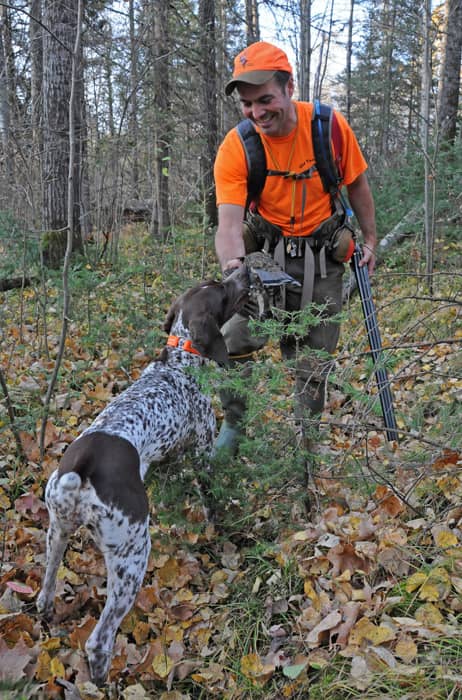Free Online Class Studies Hunting’s Role in Conservation
Patrick Durkin 02.10.15

We should probably cringe whenever someone invokes the dead to make a point, whether to rhetorically ask what they’d say about a current issue or to claim the issue is making the deceased spin, roll, or otherwise agitate in their grave.
Who are we to speak for them? The longer a person’s life and greater their intelligence, the less rigid and predictable their views often become in real life.
It’s probably safe to assume, however, that Aldo Leopold would be proud to know he helped inspire a free University of Wisconsin-Madison online course about the role of hunting in conservation and wildlife management. The four-week class, entitled “The Land Ethic Reclaimed: Perceptive Hunting, Aldo Leopold and Conservation,” is part of UW-Madison’s “Massive Open Online Course” series, or MOOC.
Professor Leopold, of course, was chairman of UW-Madison’s game management department, and helped craft the scientific principles and programs that restored North America’s wildlife populations during the 1900s.
The online course invoking Leopold’s name began January 26 and ends February 22, but the beauty of a MOOC is that participants can jump in any time during its scheduled run, or take it later at a more convenient time. Interaction with the instructors, however, ends February 22.
As of late January, more than 4,000 people had signed up for the course, which is taught by three UW-Madison educators: Tim Van Deelen, a professor of forest and wildlife ecology; Janet Silbernagel, a professor in the UW’s Nelson Institute for Environmental Studies; and Paul Robbins, director of the Nelson Institute.
The program concludes February 21 to 22 with a “From Hunt to Harvest” event at the Aldo Leopold Foundation near Baraboo. The weekend—which is sponsored by the Foundation, UW-Madison, and the Department of Natural Resources—includes a mentored pheasant hunt at the Pine Island Refuge and all-day seminars on wild-game butchering and cooking.
Slots for the pheasant hunt and the butchering/cooking demos are already filled, but a three-hour activities period Sunday afternoon is open to the public. The afternoon session includes children’s activities, archery and firearms displays, hunting gear demonstrations, MOOC information, hunting talks by Van Deelen, books from the Wisconsin Historical Society Press, and hunting dog and outdoor demonstrations.
Leopold—long credited as North America’s father of wildlife management—was an ardent hunter, which influenced the thoughts and philosophies he shared in his famous book, A Sand County Almanac. Hunting also helped shape the principles of Leopold’s Game Management, his book that outlined science’s vital role in managing wildlife and its habitats.

Van Deelen noted that hunting has been a core conservation tool for managing wildlife and its habitat the past 80-plus years. Hunters pay for these management programs through license fees and federal excise taxes on archery and firearms equipment. A UW description of the MOOC reads:
Perceptive hunters believe hunting should contribute to conservation rather than hinder it. As conservation science has improved, so have calls for understanding the role of game species in their habitats, as well as in regional politics and economics. Deer, pheasant and elk are cultural icons because of their value to hunters, and are also a source of persistent controversy because of their roles in complex ecological and economic systems.
The course is designed to help students understand the legacies of hunting and wildlife management, the role of wildlife in ecosystems, and the importance of ethics in guiding management decisions. It also looks at the “face” of contemporary hunting and conservation models.
The course’s content features the expertise of scholars, citizens, managers, and researchers, and examines how their specialties overlap in crafting policy and programs affecting natural resources. They’ll share their insights through online presentations, videos, readings, surveys, and quizzes. Participants can explore the course at their own pace, and engage in optional discussions with their peers and presenters. The UW encourages participants to complete the entire course, but some will focus only on areas that interest them.
To ensure the course lives on beyond its four-week curriculum, the UW is also bringing in Steven Rinella, author (MeatEater, American Buffalo, The Scavenger’s Guide to Haute Cuisine) and television host (MeatEater), to share his hunting experiences and his insights into wild game cooking on April 14.

This isn’t the only environmental MOOC the UW will offer this year. From February 23 to March 1, MOOC participants can study the Great Lakes’ climate and weather patterns. Further, a course on energy and the Earth runs June 21 to July 18, and a course called “Forests and Humans: From the Midwest to Madagascar,” runs September 30 to October 28.
For more information, visit https://moocs.wisc.edu, or email landethicmooc.uw@gmail.com.

